#anecdotage
Explore tagged Tumblr posts
Text
Once there was a bookshop.
Its name was "Dark They Were And Golden Eyed", the title of a Ray Bradbury short story.

I'd seen it advertised in the back of my "Conan The Barbarian" comics, black-and-white UK reprints of the US originals which came out on the same day - Thursday, I think - as a two-hour first period history lesson (9AM-11AM).
So I bought my weekly Conan on the way to school as a pleasant back-of-the-class distraction from such A-Level delights as "Metternich and the Congress of Vienna" or "Bismarck and the origins of the Franco-Prussian War" or "Causes and Consequences of the French Revolution".
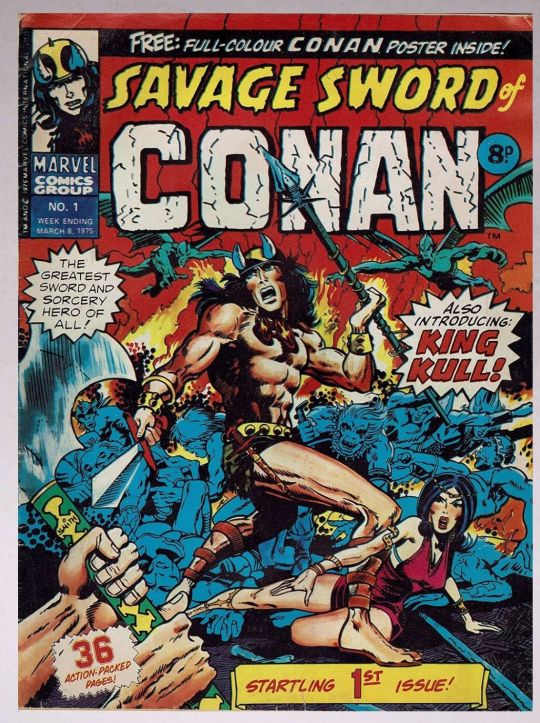
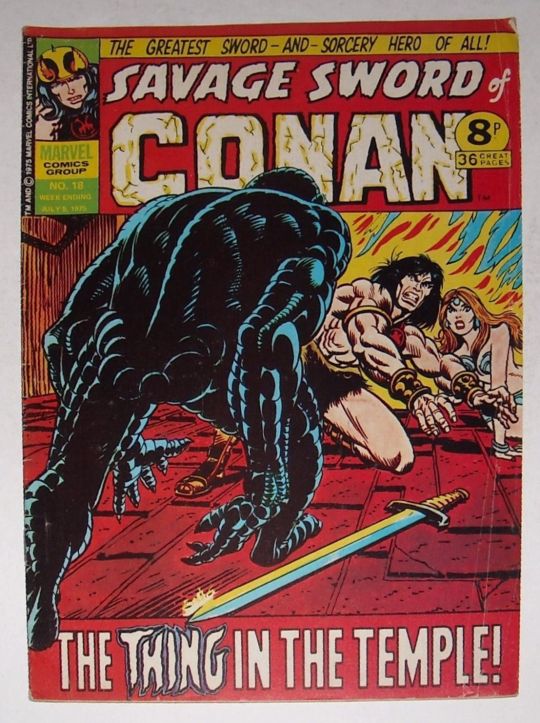
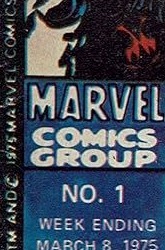
I was getting into fantasy at that time because British publishers were bringing it out like there was no tomorrow - Robert E. Howard "Conan" stories from Sphere, Clark Ashton Smith "Zothique" stories from Panther, and the Michael Moorcock book-of-the-month club from Mayflower.
Dark They Were was a sort of holy grail, because London wasn’t exactly round the corner or even a mere long train ride away as Dublin might have been, and my parents weren't willing to let me make a trip like that all alone. (I also suspect Dad had checked a map and found that Dark They Were was in the heart of Soho, a place with Other Kinds Of Bookshop.)
*****
I finally went to London after getting A-levels good enough for Uni, despite my History result not being what it might have been (no idea how that happened). :-P
Dad was right about the Other Kinds Of Bookshop, a couple of which I duly investigated and found to be educational, although not in the way intended. Even though the places I ate and drank and the books and records I bought on that same trip are long forgotten, I can still remember it.
Despite having at least my usual allowance of critical-faculty-blunting late teen hormones, the shops outweighed it with their air of furtive sleaze, like the carpet in a seedy bar that sticks to your shoes - except this was an all-body experience. They certainly filled me with desire, but that desire was for a long, hot shower.
So much for the main attraction of late-'70s Soho...
*****
Far more attractive was my discovery, just a short walk round the corner from DTW, of 58 Dean Street Records, which specialised in soundtrack albums.
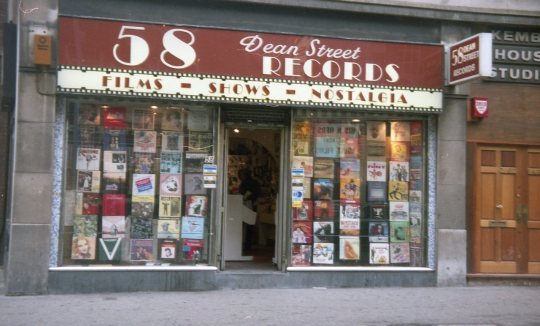
I'd been buying soundtrack LPs for years, so what with DTW and 58, I was well laden on my way home, and none of those purchases needed hidden from the parents, either... :->
Despite that, Forever People in Bristol was an even more important SF bookshop, at least to me. For one thing it was easier to reach, less than an hour away when visiting an old school friend who at that time lived in Cardiff.
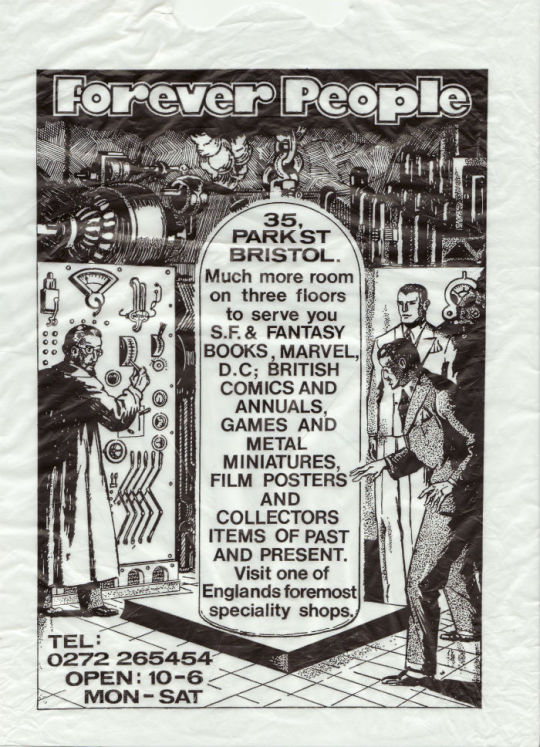
For another thing, I'd become a keen fan of fantasy anthologies, which were like samplers or tasting menus for different writers - you could call them selection boxes,and Irish / UK readers will know what I mean by that.
FP was where I found imports like Offutt's "Swords Against Darkness" series and DAW's "Year's Best Fantasy" series. I'd already got the first two in Carter's "Flashing Swords" series as UK imprints...
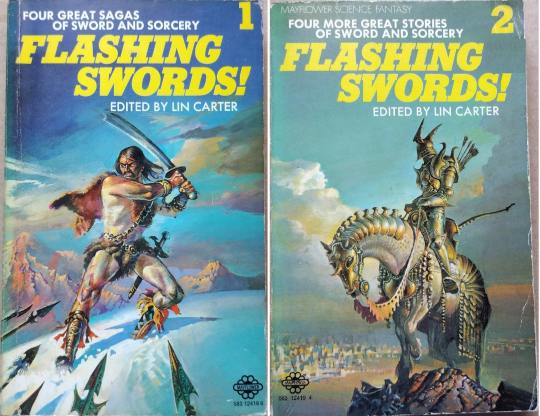
...so the instant I saw the US-import Number 5 I nabbed it.

A bit later, back in Belfast, I found a novel by one of those writers in Queen’s University Bookshop.
It was set in the same world as the short story and though the cover was, er, a less than accurate summation of the contents, those contents made for a fascinating read.
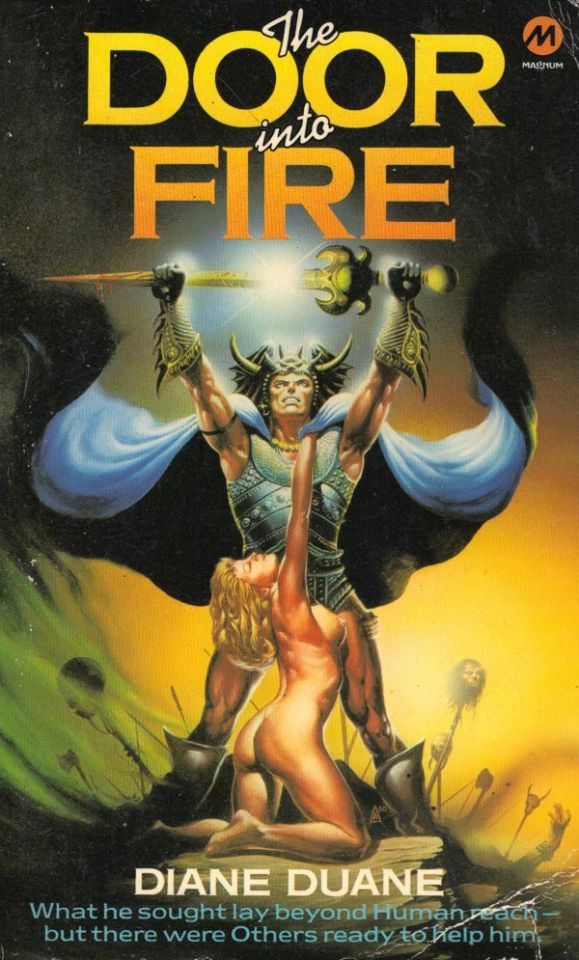
I met that writer twice, at SF conventions in 1985.
Then at a couple more in 1986.
After that came Boskone in 1987...
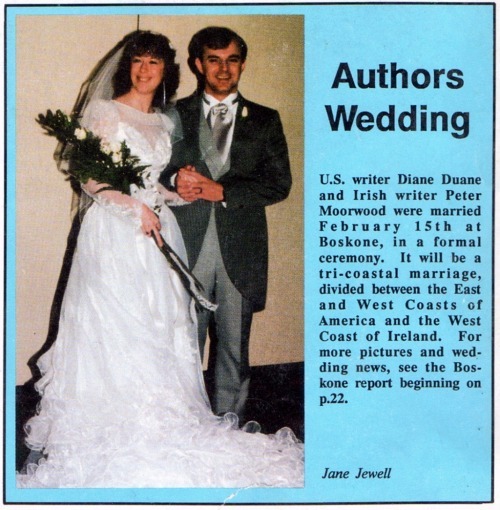
And the rest is history.
(Pedantic writer note: this has two typos. There's no apostrophe on Authors' - unless it's short for Authors Have A Wedding and I doubt that - and there's an extra O where I don't need it, a first but far from last instance of having my name misspelled in print...)
Happy soon-to-be-38th Anniversary, loved!
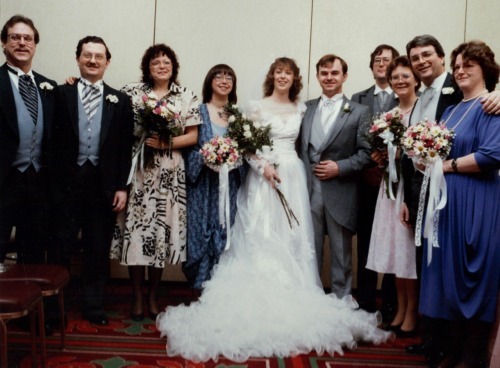
#anecdotage#anniversary#anthologies#science fiction bookshops#serendipity#Diane Duane#wedding anniversary
125 notes
·
View notes
Text
I've had bad beer and good beer, and I've had bad cider and good cider. which is why I'll never come down exclusively on one cide or the other.
Terminology note: "hard" is never applied to cider on this cide of the Pond, since by definition "cider" is an alcoholic drink.
The only time it's hard is if it's been left in the freezer too long, and even then (assuming the bottle hasn't burst) there's always some viable liquid remaining, which is seriously hard stuff though no longer really cider any more.
*****
Freeze distillation, as Discworld fans will know, is the means of making suicider, the basic ingredient for Nanny Ogg's (in)famous scumble.
This is then distilled again properly - or at least very carefully - with a still, either before or after the addition of what in the gin trade are called botanicals. Where Nanny is concerned they more properly might be called biohazards and are, in any case, A Secret.
*****
The closest thing to scumble I ever encountered was Apfelbrand distilled from the apple orchard behind - appropriately enough - the fire station in a German village.
There was a wine festival, all the traditional guilds - fishermen, woodsmen, firemen etc. - had stands selling food and drink, and much fun was had by all even though @dduane and I were asked more than once "but why are you here?"
(Because the festival had been recommended by the owner of the Gasthaus we were staying in, one village over, though our German wasn't up to that much explanation. "Für Essen, Wein und Fest!" did the job, especially with a big grin while hoisting whatever food or drink happened to be in hand.)
I was admiring one of the fire-trucks when I got chatting - in school-level English and German - to one of the firemen. When I cautiously mentioned my Dad had been a fireman during the (ahem) war, that was when the schnapps came out, for toasting my Dad, St Florian and firemen everywhere.
"Bekämpfen wir Feuer, nicht Menschen." (I'm misremembering, but it was something like "Let's fight fires, not people.")
I don't know if that stuff hadn't been diluted for bottling yet or was being kept full-strength for adding to Jaegertee, but either way it had a burn like Stroh 80 rum and was An Interesting - though eye-watering - Experience.
{$-P
Nanny Ogg would have approved.
hard cider was invented when someone decided to make beer that tastes good instead of bad
#food and drink#beer and cider#cider and apple juice#Discworld#suicider#scumble#Nanny Ogg#GNU Terry Pratchett#anecdotage
68K notes
·
View notes
Note
What's your favourite part of Ireland?
(also, unrelated question: any particular small plants - like cherry tomatoes - that can grow relatively easily in flats in this climate?)
Have a great day!
I'm fond of Co. Wicklow, where @dduane and I have lived in various places for almost 40 years.
For other reasons, I'd vote for Co. Down near Newcastle, where I spent many happy summer holidays when I was a lot younger than I am now.

I still remember the long curve of beach below the dunes, and the mountains in the distance, and the green expanse of Tollymore Forest Park in the shadow of those mountains.

It didn't take much imagination, and I've always had plenty, for the Mournes to become Misty, and Tollymore Forest to become Old, Fangorn or Mirkwood...

...and - many years later - that sweep of beach, or a fantasy version of it, was where the ships slid to shore as my novel "Greylady" began.
Also this, because some special memories have their own special time and place. :->
*****
Unrelated answer - we once grew a fine crop of Habanero chillis on seed-trays in the kitchen window, though that seems to have been a fluke because we haven't managed to repeat the trick since.
64 notes
·
View notes
Text
One Poem a Day: September
"beautiful" words related to September for your next poem/story

September - ninth month of the Gregorian calendar. Its name is derived from septem, Latin for “seven,” an indication of its position in the early Roman calendar.
Apple-polish - to use flattery or the doing of favors in order to win approval especially from a superior
Anecdotage - the telling of anecdotes (i.e., a usually short narrative of an interesting, amusing, or biographical incident)
Ardency - depth of feeling
Auburn - of a reddish-brown color
Autumnity - quality or condition characteristic of autumn
Bucolic - of, relating to, associated with, or typical of open areas with few buildings or people; idyllic
Cathexis - investment of mental or emotional energy in a person, object, or idea
Ceres - the Roman goddess of agriculture
Churn Supper - a feast at the end of the hay harvest
Cider - fermented apple juice often made sparkling by carbonation or fermentation in a sealed container
Cornucopian - being more than enough without being excessive
Demeter - the Greek goddess of agriculture
Effulgence - radiant splendor; brilliance
Estivo-autumnal - relating to or occurring in the summer and autumn
Felicific - causing or intended to cause happiness
Fête - a lavish often outdoor entertainment
Gem��tlich - agreeably pleasant; comfortable
Georgic - a poem dealing with agriculture
Harvest - the season for gathering in agricultural crops
Hearthstone - the place where one lives
Husbandry - the cultivation or production of plants or animals
Moon (away) - to spend in idle reverie; dream
Odeum - a small roofed theater of ancient Greece and Rome used chiefly for competitions in music and poetry
Prosaic - being of the type that is encountered in the normal course of events
Reposeful - of a kind to induce ease and relaxation
Rubicundity - ruddy (i.e., having a healthy reddish color)
Sapphire - a gem variety of corundum in transparent/translucent crystals of a color other than red; a deep purplish-blue color
Surfeit - an intemperate or immoderate indulgence in something
Torridity - parched with heat especially of the sun; hot
Victual - to supply with food
Sources: 1 2 3 ⚜ More: Word Lists
If any of these words inspire your writing, do tag me or send me a link. I'd love to read your work!
#word list#september#writing prompt#dark academia#spilled ink#writeblr#writers on tumblr#poets on tumblr#poetry#literature#langblr#linguistics#words#light academia#lit#autumn#writing inspiration#writing ideas#writing inspo#creative writing#writing reference#rene magritte#surrealism#landscape#nature#moon#writing resources
103 notes
·
View notes
Text

The book is called The Good, the Bad and Me: In My Anecdotage
16 notes
·
View notes
Text
This is excellent advice for the treatment (or apparent maltreatment, in linen's case) of natural fabrics.
Here's some additional info based on personal experience over many decades and numerous ways of doing laundry from ancient (well, early 1960s) to modern.
Wool. A splendid outer layer, since rain sits on rather than soaks in, but needs care when washing, and even more when drying. Don't wash a woollen garment on Hot, and definitely don't dry it that way. If you do, your favourite woolly pully will shrink to something for a child, and a child's woolly pully into something for a doll. I have done this, and it was not well appreciated except, way way back, by my small sister and presumably by her nattily pullovered favourite doll.
Cotton. Will indeed shrink a bit after washing and drying, but fortunately will stretch again during wear. Can be washed very hot to get rid of Those Annoying Stains, and by Very Hot I mean boiled. It'll still stretch back - eventually - and although sometimes uncomfortably snug during the stretching process, will nevertheless be nice and clean.
Silk. Usually expensive, so accordingly laundered with probably more care than it needs, since this is a fabric once used (in many layers, granted) as armour. Does Not Chafe, which is why it was worn as scarves by fighter pilots who had to keep turning their heads in case of The Hun In The Sun. "Silk hiding steel" is appropriate, because a lady with a Hermés (not "an 'ermes", you pronounce the H) silk scarf and something to weigh it with is not as unarmed as she seems.
Linen. The 600lb gorilla of the fabric world, only bettered by hemp. Can have a weave tight enough to carry water without dripping - especially after the weave soaks and swells - and a tensile strength enough to carry pounds and kilos of it. (You can still buy collapsible "canvas" - usually linen or hemp - buckets...) @dduane and I inherited a lot of Irish Linen from my Mum, some still in original boxes with original washing instructions. Those instructions were, more or less, "rub soap into stubborn stains, scrub thoroughly and boil until clean".
Where linen and hemp fabrics are concerned...

*****
Even though she had a succession of increasingly modern washing machines, Mum also had and occasionally used - or more accurately supervised my use of - some quite old-fashioned laundry equipment.
Linens with stubborn stains were indeed scrubbed thoroughly, using a block of hard soap then a washboard, and an impressive abs workout it was...




Then the scrubbed stuff was boil-washed in Mum's washing machine (which could reach a genuine 100°C rolling boil) before being rinsed, passed through the mangle (or wringer, more in this post) and pegged out on the washing-line to dry.
*****
As i hunted up illustrations I (re-)discovered a Terry Pratchett Discworld connection. Remember the "copper stick" used by Granny and Nanny to summon the demon in "Wyrd Sisters"?
"What are you going to try?" said Granny. Since they were on Nanny's territory, the choice was entirely up to her. "I always say you can't go wrong with a good Invocation," said Nanny. "Haven't done one for years." Granny Weatherwax frowned. Magrat said, "Oh, but you can't. Not here. You need a cauldron, and a magic sword. And an octogram. And spices, and all sorts of stuff." Granny and Nanny exchanged glances. "It's not her fault," said Granny. "It's all them grimmers she was bought." She turned to Magrat. "You don't need none of that," she said. "You need headology." She looked around the ancient washroom. "You just use whatever you've got," she said. She picked up the bleached copper stick, and weighed it thoughtfully in her hand. "We conjure and abjure thee by means of this—" Granny hardly paused – "sharp and terrible copper stick."
It's one of these, not made OF copper but meant for use IN a copper.

Mum had one, originally Granny's, which kept getting pinched to play the role of sword, baton or whatever, though its official purpose was to stir, untangle and finally remove laundry which had been boiled in a "laundry copper":


This one shows how it straddled two gas jets, but Nanny Ogg's copper had a fireplace space under the actual cauldron (though in summer she used it as a beer cooler).


These cauldrons were still called "coppers" even when more cheaply made of iron. It's another instance of how vacuum cleaners became "hoovers" and sticking-plasters became "band-aids" etc., etc., no matter what brand they really were.
"Boil", however, wasn't a figurative term. It meant what it said, and those thoroughly scrubbed linens (cottons, too) would bubble merrily for quite a while "until clean".
Coppers were also used for cooking, with perhaps the most famous literary instance being chez Cratchit in "A Christmas Carol":
“A great deal of steam! The pudding was out of the copper. A smell like a washing-day! That was the cloth. A smell like an eating-house and a pastry-cook’s next door to each other, with a laundress’s next door to that! That was the pudding!"
Mum initially had a separate electric boiler - IIRC it was Burco brand, which still makes much smaller boilers for catering, though ours was never used for anything except laundry - but mostly I remember the boil being done in her washing machine.
More modern machines only go to 90-95°C, sometimes just 60°C, but when her Hoover was running at full belt, things got as lively as any pot on a hob even before the agitator started churning. Never mind closing its lid to avoid mess, when a boil-wash was taking place that lid was also a needful safety precaution against scalding splashes.
*****
Removal by copper stick was superseded by use of tongs, and Mum had a set just like these...

...though I don't think hers had such an apt name.


Stirring with the copper stick was replaced by washing with a posser, which pumped up and down, or a washing dolly, which rotated.


Both actions have been replicated by washing-machines, and though variants of the dolly rotation became almost standard in tub washers, the posser did appear in an early 20th-century hand-operated machine...

...as well as the Frigidaire "Jet Cone" washer...

...whose action, TBH, reminds me of certain non-laundry gadgets I saw many years ago in The Pleasure Chest on Santa Monica... :-P
Modernised possers or even original designs are still available today.


*****
Whenever you read in stories about avoiding trouble with laundresses, those devices along with scrubbing, wringing out and cranking mangles are why. Regular workouts with laundry equipment gave them the sort of muscles nobody wanted to provoke.
*****
I've already mentioned "A Christmas Carol" and, given the time of year (posted 22nd December 2024) this ought to end with another one, so...
As shepherds washed their socks by night, All seated round the tub, A bar of Sunlight soap came down And they began to scrub...

You're welcome.
:->
Here, a cheater course on caring for natural fibers!
1. Wool. Treat it like it has the delicate constitution of a Victorian lady and the conviction that baths are evil of a 17th century noble. (If I get in WATER my PORES will OPEN and I will CATCH ILL AND DIE.)
2. Cotton; easygoing. Will shrink a bit if washed and dried hot.
3. Silk; people think it’s like wool and has the constitution of a fashionably dying of consumption Victorian lady, but actually it’s quite tough. Can be washed in an ordinary washer, and either tumbled dry without heat or hung to dry.
4. Linen; it doesn’t give a shit. Beat the hell out of it. Historically was laundered by dousing it in lye and beating the shit out of it with wooden paddles, which only makes it look better. The masochist of the natural fiber world. Beat the fuck out of it linen doesn’t care. Considerably stronger than cotton. Linen sheet sets can last literal decades in more or less pristine shape because of that strength.The most likely natural fiber to own a ball gag.
#fabric care#period laundry#old tech#social history#anecdotage#GNU Terry Pratchett#Discworld#Wyrd Sisters#Youtube
69K notes
·
View notes
Text
"Quality Street" sweets - TIL that...
...despite this particular brand of sweets appearing in my childhood most often at Christmas, historic costumes worn by characters on the tins were NOT a part of the widespread "Dickensian Christmas" look which appeared so often on cards and packaging.
Instead it's because the characters and their Regency costumes were inspired by a play by "Peter Pan" author J. M. Barrie.
The play was called "Quality Street".
And the tins are collectibles.






*****
A Christmas-related appearance of the sweets was mostly coincidental, though the empty tin from one year did often appear at the next, full of home-made mince pies or even an entire Christmas cake.
Large, fairly airtight tins are useful that way, especially at trapping the spirituous exhalations of cakes made in mid-September and "fed" weekly thereafter with spoonfuls of brandy, or whiskey, or rum (sometimes all three, alternated) until it was time for the armour-plating of marzipan and royal icing to go on.
It used to be a common belief at home that opening the tin containing an un-iced cake near a naked flame at any time after mid-November was more than the opener's eyebrows were worth.
The eyebrow thing never happened, because it was one of those family fables, but I do remember bringing one such Quality Street tin down to Anne McCaffrey's house when I'd been invited to stay.
It contained not a Christmas cake but one of Mum's famed Chocolate Gateaux of Doom (my name for it, not hers), made specially for that visit and whose recipe, what with the plain-chocolate sponge cake and the apricot-cream filling and the double-chocolate ganache icing, required most of a bottle of cognac.
Since this cake didn't have the sealant-and-spackle cladding of marzipan and royal icing, it also required refrigeration to "keep it calm". My car didn't even have air conditioning, so in transit the cake got quite, er, excitable.
How excitable, we soon found out.
When Annie's stable manager sauntered over and popped the lid, expecting to find some nice Quality Street choccies, she was instead hit in the face by a near-visible cloud of booze vapour (a gin-ie, perhaps, even though no gin was involved) and reeled back with a cry of "Jaysuz, does yer mother own a feckin' distillery?"
Had she been smoking one of her habitual thin roll-ups at the time, our family fable might have been proved true after all...
:->
#Quality Street sweets#Quality Street play#historical costuming#advertising#brand recognition#Christmas cake#chocolate cake#boozy cake#who needs eyebrows?#anecdotage
131 notes
·
View notes
Photo









#annabella soong#breakfast at tiffany's#this whole convo i cannot take my eyes off her#the SHADE#when you can make your face broadcast lol tHiS PoStUrInG dOuChE under the guise of ~fascinating cocktail anecdotage#that is true shademusement mastery#i live for her little eyerolls#also the smirks#laaaaadies in red#going on a face journey#thirsty anyone?
7 notes
·
View notes
Text

I was reading Eli Wallach's autobiography (The Good, the Bad, and Me: In My Anecdotage) and I saw this........
#HOWLING#this is gold#there's only one bed#eli wallach#clint eastwood#blonco#autobiography#the good the bad and the ugly
156 notes
·
View notes
Text
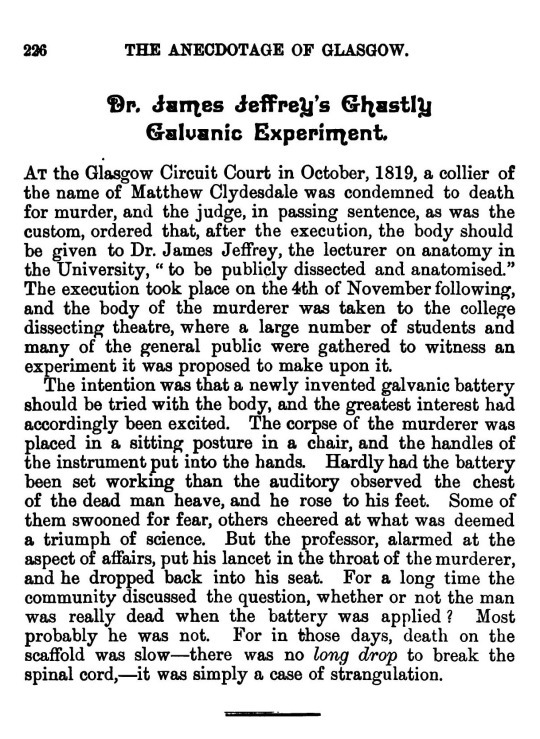
From The Anecdotage of Glasgow, by Robert Alison, 1892. (See also: this alternative account of the incident.)
Dr. James Jeffrey's Ghastly Galvanic Experiment
At the Glasgow Circuit Court in October, 1819, a collier of the name of Matthew Clydesdale was condemned to death for murder, and the judge, in passing sentence, as was the custom, ordered that, after the execution, the body should be given to Dr. James Jeffrey, the lecturer on anatomy at the University, "to be publicly dissected and anatomised." The execution took place on the 4th of November following, and the body of the murderer was taken to the college dissecting theatre, where a large number of students and many of the general public were gathered to witness an experiment it was proposed to make upon it.
The intention was that a newly invented galvanic battery should be tried with the body, and the greatest interest had accordingly been excited. The corpse of the murderer was placed in a sitting posture in a chair, and the handles of the instrument put into the hands. Hardly had the battery been set working than the auditory observed the chest of the dead man heave, and he rose to his feet. Some of them swooned for fear, others cheered at what was deemed a triumph of science. But the professor, alarmed at the aspect of affairs, put his lancet in the throat of the murderer, and he dropped back into his seat. For a long time the community discussed the question, whether or not the man was really dead when the battery was applied? Most probably he was not. For in those days, death on the scaffold was slow—there was no long drop to break the spinal cord,—it was simply a case of strangulation.
#galvanism#medical history#old books#vintage books#1810s#united kingdom#scotland#historical true crime
2 notes
·
View notes
Text
The unfounded platitude that "Europe is so much better than America," consists primarily in misconstrued OECD data, and confirmation-biased anecdotage from touristic ventures to The Champs-Élysées and Saville Rowe. Little rests at the core of the assertion beyond the foreign appeal of cobblestone streets, fachwerk houses, and the general 18th century style of such cities as Copen Hagen, Paris, and Berlin.
#politics#europe#america#philosophy#sociology#religion#european politics#european union#american politics#american history#psychology#human behavior#human nature#history#capitalism#socialism#epistemology#marxism#libertarianism#liberalism#conservatism#economics#macroeconomics
6 notes
·
View notes
Note
Given their reputation for stinging people, I wonder who exactly was the first person to ever discover that nettles were edible?
Another of those mysteries lost to time, like "who was the first person to eat an oyster?"
The oyster one almost certainly originated in "if hungry enough, people will eat anything", so maybe the same experimentation-through-necessity thing applied to nettles?
*****
There could also be an element of petty vengeance following a day of getting thoroughly stung.
Like the time in summer 1976 when I was briefly stationed at RAF West Raynham, and on one particular day off went canoeing along a river in Norfolk.
Inevitably I tipped the canoe and the easiest way to right it - I know about turning it over and sloshing the water out, but this was EASIEST, right? - was to swim, pushing the inverted canoe ahead, to the river-bank.
Summer 1976 was incredibly hot, so...
I was wearing just Speedos, Ray-Bans, sun-block and a boonie hat...
Which meant that discovering the lush green of the river-bank was a chest-high thicket of nettles, on both sides, with no breaks in sight...
Was Not Fun.
By the time I was back in my canoe and paddling away from that river-bank I was NOT a happy camper, and would cheerfully have unloaded a bucket of instant sunshine over every nettle on the planet.
*****
I can well imagine some glowing, tingling, itching prehistoric hunter-gatherer chucking a huge armful into boiling water with a prehistoric cry of "See how YOU like it!" and discovering shortly afterwards that the nettles:
Smelled good;
Were no longer stingy;
Tasted good as well.
There are plenty of recipes on-line for nettle soup, from simple to elaborate. Come spring, when the greens are young and tender, put on a pair of gloves and inflict some culinary vengeance of your own.
:->
*****
How someone discovered that nettles could be treated the same way as hemp and flax in order to create a weaveable fibre is another question. More experimentation, probably.
*****
And now, for some reason, I've got an overwhelming desire to scratch...
91 notes
·
View notes
Text
We've never had problems knife-testing banana bread - the most recent version, about 10 days ago at time of this post, had fresh ginger and chopped walnuts as well as bananas, and was delicious.

Its write-up will appear on "Mind Palate" later.
*****
Jams and jellies are another matter entirely.
The first and so far only time @dduane made bramble jelly (from my Mum's recipe) it turned from an is-it-set? test to a royalty test, the one that goes
"Whoso pulleth forth this knife from out this home-made jam and jar is rightwise King Born of All England."
The knife didn’t break as it went in, but it didn’t come out again. Not by an inch, not by a millimetre, not by the width of a gnat’s whisker.
If you want to choose the next King of England then forget swords in stones and anvils, stick one in this stuff. I am NOT King of England (neither is DD) because the knife never came out.
However, the bramble jelly did, because after much effort (not unlike that scene in "Excalibur")...

...it left the jar as a single unit with a sound like an enormous finger-in-cheek pop and looked vaguely like a lollipop, but neither of us risked our teeth by nibbling it.
The knife-blade, still stuck fast, showed what might happen.
We got the knife free eventually, by a combination of whittling off everything that didn’t look like a knife and pouring boiling water on the rest.
Those whittled bits went into the food processor along with sugar, Bramley apples, sugar and cinnamon to make filling for a blackberry-apple pie. Even at the end of all, the blackberry part was still a touch chewy, but no longer risked providing any tooth-or-filling-replacement work for dentists.
And it tasted great.
*****
Later investigation revealed that I'd helpfully added liquid pectin to help the jelly set, without first asking if DD was already using pectin-enriched jam-making sugar.
Which she was.
Memo: as with so much in life, try one or the other before both at the same time.
:->

#food and drink#making jam#making jelly#pectin#sets like concrete#banana bread#Mind Palate#anecdotage
12K notes
·
View notes
Quote
When a man falls into his anecdotage, it is a sign for him to retire.
Benjamin Disraeli
0 notes
Text
the straw boy story
Swimming to Cambodia is probably the most famous of all the monologues that Spalding Gray wrote and performed through his relatively brief career in the 80s and 90s. In print, it’s a short book of just over a hundred pages in which he mostly describes the small role he had in The Killing Fields, a film from 1984 about the genocide under the Khmer Rouge in Cambodia. By this time Gray had been acting and performing for some years, but he wasn’t a movie actor, and in his story here he does very little acting; the movie was shot in Thailand, where he seems to have spent much of his time bumming around, drinking and getting high, and watching in awe and confusion.
Part of the monologue is a potted history of Cambodia itself, complete with a summary of America’s disastrous role in prompting the crisis; it is fairly scathing stuff, considering that this was published less than ten years after the Khmer Rouge occupied that country. Another part covers the production of The Killing Fields, which is replete with Ballardian overtones — the whole thing seems a strange exercise in hyperreality, involving as it does local refugees and Cambodian nationals who had themselves involvement in the original disaster. But mostly the monologue involves the author musing on the state of his career, the world, filmmaking, and life in general.
It is, of course, a written document of a thing that was intended to be performed rather than read. Gray’s on-stage monologues were typically performed with him spoken behind a desk, with only a couple of props — paper and a glass of water — perhaps a map, or a record player or boombox, if the show demanded it. Inevitably elements would be added and removed as the performances went on. At the time that Gray was operating, he seemed to be doing something new and refreshing with performance. His arch, WASP-ish mannerisms gave it a familiar frame of after-dinner anecdotage, but it was something altogether richer and more nuanced. It was a combination of monologue as memoir, all mixed up with improv, stand-up and confessional.
If we consider something like Krapp’s Last Tape as the apotheosis of modernism, then Spalding Gray might look something like a poster boy for postmodernism. Instead of sitting at a desk and tape recorder with nothing to say beyond near-wordless reminiscence, here is a man who does the same but with everything to say — all of it filtered through the lens of himself and refracted back at the audience, with every anxiety, every delight, every humiliation blown up to cartoonish size. Imagine a high-minded Seinfeld where everything mattered too much, rather than not at all. Imagine Kerouac with a conscience. In many ways Gray looks today like an early emblem of an art method where every aspect of one’s private self becomes fair game as a subject for public scrutiny, and for all kinds of artistic reproduction.
How well this approach has aged is an interesting question, though it is ultimately somewhat irrelevant. Something chafes around the idea that some privileged white guy should travel to Thailand to take place in a reconstruction of a genocidal event and think: ‘yes, the most interesting thing going on here is me’. This is a cynical way of looking at it. But if Swimming to Cambodia was performed tomorrow, one wonders if readers would be so tolerant of the author’s dabbling in the Thai sex industry. Gray called his own work ‘poetic journalism’, and it’s difficult to imagine such a description being applauded by readers today, ever since the media starting getting seriously creative with the truth. Neither wry detachment nor unconstrained self-interest will suffice as artistic motivators. Better for our poets to be poets, and for journalists to be journalists; we’ve been stung by those who tried to do both.
I used the word ‘irrelevant’ because Gray’s method is everywhere. It might even be the dominant artistic ethos of our times, particularly for the aspiring comedian or performer. There’s something of his work in the knowing style of Fleabag, which also began as an on-stage monologue. And consider podcasts, though it’s notable that those are mostly based around group conversations and special interests – YouTube and Twitch are better suited to the single-voice format. And there are still a few ‘storytellers’ at large; the most famous inheritor of Gray’s style is probably David Sedaris, though it would take too long to explain here why I find his work almost entirely unbearable.
The same ethos has crept into media culture at large. It seems like every week we celebrate a new personal essay which mingles the big issues of history and politics and gender with reminiscences of trauma or recollections of tragedy. The personal is political, so the political must start with the personal: sitting in front of a mic (real or otherwise), spilling one’s guts. Often selling one’s own work involves an effort of putting one’s personality out there first, and using that as a way to draw an audience to what you really want them to see. And this is perfectly fine, as long as one accepts the idea that you cannot expect to withdraw that personality at a later date and maintain the same level of profile.
There can no longer be any clear divide between an artist’s public persona and their private life. And it is becoming increasingly hard to imagine a way of being that involves opting out of that aspect entirely. We are all setting out our little tables and chairs on the biggest stage imaginable, talking to ourselves, waiting for an audience that might never arrive.
5 notes
·
View notes
Text
Afternoon Delight: Brett Anderson Interviewed
by Tariq Goddard
The Quietus, 3 October 2019
Tariq Goddard sits down with Suede frontman, Brett Anderson for a frank talk ahead of the publication of Afternoons With The Blinds Drawn, the second volume of the singer's memoirs

Portrait by Paul Khera
Coal Black Mornings, the first volume of Brett Anderson’s memoir, was a haunting and unusual addition to the genre, eschewing the devices and gimmickry that are the principle selling points of a rock star confessional, for a harrowingly reflective and thoughtful overview of his early years. Anderson took the reader back to a time before the music, to the experiences that informed the songs, albums, and eventual career trajectory, and in doing so, circumnavigated the years of his triumph during which he rose to public prominence and critical acclaim.
His onus on the creatively formative period that preceded success, the tender portraits of his family, particularly his complicated relationship with his father, a man who may have wished he had the life his son had, and the recollections of an England that has vanished so completely as to no longer be a place, offered a more unique and heartfelt history than the celebrity tittle-tattle fans might have thought they wanted. To do anything comparable with the second volume, a story Anderson vowed not to tell, would at once be easier for him - his material would span the glory days of his career - yet harder, for how could the tenderness of the first book survive grubby contact with the reality of wild adulation and Britpop, a “movement" he admits to despising?
Perhaps to his own surprise Volume II, Afternoons With The Blinds Drawn, strikes the same ruminative notes as the earlier volume, again subverting convention and expectation to avoid cliche and disappointment, written in the vulnerable and careful voice of its antecedent. Instead of dishing up insider gossip, Anderson mentions none of his rivals or contemporaries by name, assiduously sticking to the frequently scorned advice of “if have nothing nice to say, I say nothing”. Portraits of associates, friends and ex-friends are generous, forensic but fair, and there is no attempt to airbrush or underplay anyone else’s role in contributing to Suede’s imperial phase.
Knowing that the man he became in this second volume is not as sympathetic as the youth he was in the first, Anderson goes on to slay the most prominent elephant of all, himself, through pages of literary flagellation few writers could self-administer uncoerced.
Driven by the desire to work out what really happened to him, Anderson’s writing follows an unashamedly conceptual arc (“archetypes”, “convergence theory” and “postmodern play of mirrors” all appear on a single page), constituting a historical inquiry into the motives and processes that lay behind his best and worst work, by way of remorseless self-analysis, painful descriptions of how others must have seen him, and an attempt to grasp why we all think we are right at the time. The light shed and insight shared in these two volumes places them in the same covetable space as Springsteen’s Born To Run or Dylan’s Chronicles, and would be worth cherishing even if Brett Anderson was the reason why you never liked Suede in the first place.
Musicians often write books to sustain and propagate a persona that they have developed over a career, not deconstruct one in a spirit of enquiry. This book reads like it was written by that hidden aspect of yourself that wrote the songs in private, and not the public alter ego we saw perform them…
Brett Anderson: Absolutely, that is the main premise of the book, that it wasn’t going to be written by the Brett Anderson persona but whoever the real person behind it was. The reason why Coal Black Mornings ended where it did was because my public persona didn’t exist then, and I deliberately stopped the story before it had been formed. What I didn’t know was whether I could actually write another book in that same voice I had developed in the first, dealing with the next period of my life, and not drift into public persona I had created by then. It was a massive conundrum for me, as people might be familiar with the events and that version of me, and expect something consistent with that, while I knew I wanted a more personal and interesting story, told in the natural voice of the first book.
There is something I want to be clear about though, this thing with the persona we’re talking about is that it wasn’t necessarily false in the way people understand that to be. I wasn’t just the man behind the mask manipulating people’s view of me, because to inhabit a persona you have to believe in that persona too. Looking back it’s possible to wonder how much of it is really yourself, as it is you and not you at the same time, but all of it still comes from you. You are the one doing it. I mean, everyone manufactures personas all time. People in the public eye simply amplify the process, and the lens of the media then helps magnify and distort the original amplification. The “you” that sits down and watches TV with your family is very different from the “you” sitting here now, but that doesn’t mean that your public self is some Svengali like manipulation of reality. The persona you decide to project says as much about who you are as your private self does. And it was only through growing up, growing up and not giving up these past eleven years, and having kids who you can’t fob off with a persona, that I went through the slow and painful process of taking apart the nuts and bolts of what mine was made of.
The book does come up short on after dinner speaking anecdotage. Although it is often very funny, it doesn’t seem to see its function as to amuse, does it?
BA: No, not at all. The book is a search into what happened to me in those years of success and fame, and what effect that had on me as a person, not a parade of all my achievements, where I ask the reader to look at me and love me. Like the first book, I used my writing as a sounding board very like therapy, and used the questions I was asking of myself to work out my own shit.

Portrait by Pat Pope
Notes from therapy don’t normally make for very interesting reading though…
BA: They don’t, and I knew I was running a risk. In one of my favourite reviews of Coal Black Mornings the reviewer writes, having given it two or three stars out of five, I’m not sure which is the more dismissive number, ‘this book is very well written but the big problem I had with it in the end is it is all about him, him, him!’ Well of course it is, it’s a memoir! Memoir has to take the risk of being indulgent to work.
But for a memoir, I found you very impatient with your own perspective. There’s very little self justification or score settling, often it’s like you’re trying to establish something very close to historical objectivity? Even though you keep saying that it is impossible to do that.
BA: I realise I wanted to know everything that was going on around me at that time, that wasn’t just me or to merely repeat or excuse how I saw things then. And I really didn’t want to fall into one of the lazy tropes of the genre which is just to sit there and slag off other bands. There is a vitriol in there, but I apply it to movements and features of the period, not individuals, partly because I know how the media works now. As soon as you slag off a name, that’s all your book becomes, and you lose all control or ownership of context, and simply end up as a line in a feature in quotes of the year. A memoir is about context, a complex tapestry, not a motormouth series of quotes, and you don’t want to lose that by being petty or boring, or revisiting past rivalries. I mean, who cares who ticked me off? The crazy thing is that there are people who want you to name names and write that kind of book, but I wasn’t prepared to.
But readers are more used to engaging with a work of that kind, aren’t they, who blew coke up whose arsehole?
BA: Absolutely, but the books that do that are the same story with the names changed, you know, the amusing band shenanigans, all the japery, the dirt, all of it is essentially the same tale every time. But that is the expectation, and to be honest, critics can be just as predictable. I’ve had reviews saying that Coal Black Mornings was really good but who was it really for, as it doesn’t sit comfortably in the genre they think it is supposed to be in. But for me that’s a good thing. It’s meant to be more ambitious and about trying to get to the bottom of things and to understand life. Basically the opposite of a series of oft repeated anecdotes. The anecdotes that I have included are the things that are important to me that no one else could have ever known about, because they were purely personal or because sometimes there was simply no one else there to observe them. Whether it’s the beautiful girl who comes up to me just to tell me my band are shit, or the cheese and pickle sandwich I took with me on my first flight to America, these were the things I wanted to share so that I would know they had really happened. You know, the strange and quirky little things that give your life back to you, as they thread in and out of the story everyone else thinks they know…
You are hard on yourself in the book, but you are also very hard on your own music, which from a fan’s point of view might be tough to take. Reading that you have never rated your most successful singles, or that people’s favourite songs had working titles like 'Pisspot' and 'Sombre Bongoes' for example…
BA: Yeah, 'Stay Together', 'Electricity', the Head Music title track, and 'The Power', yeah, I take the sword to them all, but I had to be that self critical in order to be convincing. If I just sat there saying, “I’m a fucking genius and everything I have done is brilliant” anything else I would say would carry zero weight! Especially if I then want to go on and talk about the songs I really do still love, 'Heroine', 'Killing Of A Flash Boy', 'Sleeping Pills', the list goes on. It’s all part of subverting the myth of the god given seer, like the bit where I talk about myself honestly as a musician and admit that I am not a particularly talented one, but what I do have is that I just don’t fucking give up.That admission for me was a moment of truth, it just isn’t what most musicians say, and so another attack on the supposed elegance of my persona. But in the same way I view myself at points in my past as a different person, I see some of those songs as written by a different person, and that is why the flaws so easily reveal themselves to me. As for being hard on myself, again, I had to be. My mistakes were entirely my own and no one else’s fault, certainly not the fault of any childhood trauma or external stuff, and I needed to take responsibility for that. My descent into hell came from being romantically attached to the notion of the artist as a genius that accepts no limits or boundaries, it was that simple.
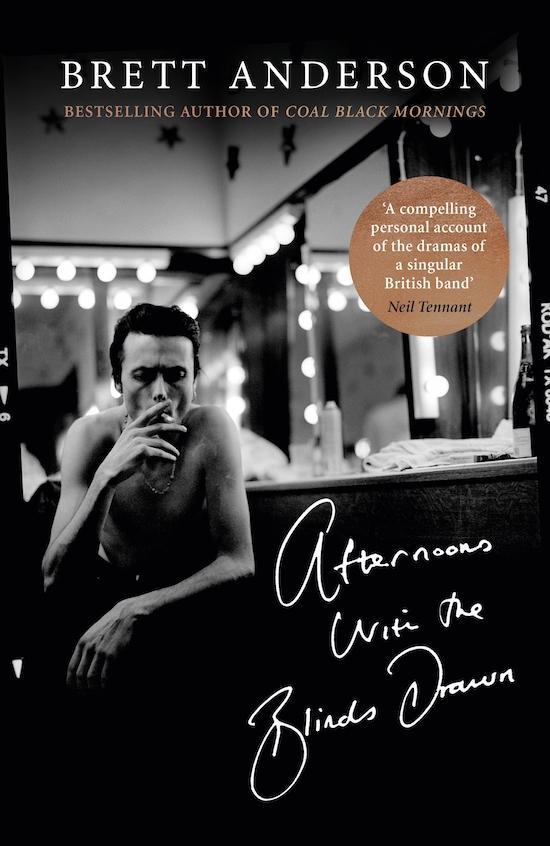
Do you think the experience of the relatively fallow and low periods in your career helped you develop the sensibility and humility with which you wrote this memoir? That continual and unbroken success may have robbed you of certain insights that disappointment helped provide?
BA: Yes, the end of the band meant I was able to jump off the bandwagon I had been on and develop a different perspective. Those were key years for me as an artist, that I had to have away from Suede, before we came back again. Experiencing struggle and failure, having had success, was crucial for me. I loved making solo records but it did start to feel like a bit of a vanity project as you do need an audience, and there is a certain point where if you drop below a particular level, you begin to wonder whether it is still worth doing. The work may still stand up, but if there’s just a select group you are appealing to, buttressed by family and friends, you can feel like the basic relationship you need with an audience, in order to create, is breaking down. And with having a family too, I thought I couldn’t afford to go on like that anymore. A performance, a book, a song, all these things require an audience, it’s a plea, you are projecting your voice out there and you require an echo in return. Otherwise you’d just stay in your own room and write for yourself, which is what some artists claim to do, but it’s an attitude I have never shared. Because half the point of creating anything is the reaction. I’ve never understood the cliche of the artist that only creates for themselves and never reads their own press.
You have to be Kafka to really not care what happens to your work. Most artists hope for perpetual immortality, on their more modest days.
BA: But did even Kafka really not care though?
He did leave his work with his best friend and literary executor to destroy.
BA: Exactly, his best friend and literary executor! Interesting that he chose a man who thought he was genius for that task! If he really felt that way he should have given everything to someone who really didn’t give a shit about him or his work.
Contingency and chance is one of the big themes of your book. One of the very few contemporaries you name, and then very affectionately, is Loz Hardy of Kingmaker whose fortunes you contrast with yours. You seem to be asking did you succeed, and he fail, because of the hidden hand of destiny, Darwinian necessity and artistic merit, or has the whole of your and his career been the most monstrous fluke?
BA: I thought long and hard about whether to involve Loz in any of this, and there is a part of me that felt bad about it, and so I tried to be sensitive in how I talked about him, as I have warmth for him and always really liked him. But I had to include him. We were thrown together by the Melody Maker’s “dog shit and diamonds” piece, a gladiatorial contest they set up where we were used as symbols for different musical and aesthetic tendencies, and there was no way for me to explore the questions I wanted to if I ignored that. The fact is Kingmaker did not go onto achieve success, but I hope I didn’t trample on them when I refer back to that point where we found ourselves in the same place. I genuinely wanted to work out whether things happened for us in the only way they could have, and if you can judge your own worth on the basis of success, as the ultimate criteria, or if it is all down to chance in the end.
You go on to say that the neglect of great art makes you wonder whether it is all chance, however much it might suit you not to think so…
BA: Exactly, look at Echo And The Bunnymen for fuck’s sake! They’ve made amazing music but why aren’t they then given the prestige they deserve, whereas so many of their less talented contemporaries fill up stadiums at the drop of hat? How can you resolve it? It’s unresolvable! But I think you need to believe in destiny wholeheartedly to make it at anything, and it is easy to when everything is going right, you know “my success is my destined birthright!’, but then how can you have any framework or belief system left if you embrace destiny and then fuck up? You’d be complicit in your own fall. Even then though, you can make failure work for you, and realise the fuck-ups were necessary too, and that you learn from them and they therefore feed your future successes, so you’re kind of led back into destiny again. The thing is if you are happy with where you have got to in life, and looking at things from a place of satisfaction, then you literally can’t really regret anything, as the fuck ups are part of the journey that led you to where you are, and are as easily as important as the successes.

Photograph courtesy of Phillip Williams
You make a number of complimentary references to the old music press in the book, even when they turned on you, which is rare for a musician…
BA: God yeah, we’re culturally less well off for their folding, don’t you think so? That whole Punch And Judy journalism and playground tribalism produced so many great bands and so much great discussion no matter how ugly it got. Those papers were like a music factory. A lot of modern music writing, with some very obvious exceptions that I love, is too dry and balanced. Growing up to a point where you can’t be violently partial means you lose something of the enthusiasm and passion that draws you to music. Music writing needs to be a little bit impetuous because music is impetuous. It’s easy to think it was all divisive and unnecessarily nasty, but it needed to be, that was its job, which encouraged it to issue challenges and be creative in its own right too. Which was great, providing they were saying nice things about us!
How has the creative process changed for you now that you are no longer committed to releasing album after album in quick succession, a process you say that led to the creation of some inferior work; does that easing of pressure and allowing of material to gestate compensate for what is lost, which is that in the old days you didn’t know what was going to happen next, and that every new record might yet change your lives with as yet unimagined success?
BA: There’s a trade off. The eventual realisation that you are not part of the mainstream anymore, as we clearly no longer are, does give you the freedom go to interesting places you could not always have gone to before. For me now the concept of a record has to be very strong to act on it, and I won’t start writing simply because it is time to release a record again. For example, the material and ideas I thought would be perfect for A New Morning, were actually followed through on and became The Blue Hour sixteen years later. Trying to carry them into the songs I was writing at the time, and make a record about the darkness of the countryside when you want your songs to be rotated on Radio One, was never going to happen. And that’s one of the beauties and consolations of being set adrift from the mainstream, which is that you really don’t need to worry anymore about a particular kind of career path anymore. We’re never going to latch back onto the mainstream again, I know that, because we could make the greatest record we’ve ever made, or has ever been made, and we would still never be on Radio One again. And I’m fine with that now. I am a 52-year-old man, do you know what I mean? Age has got to give you something, because otherwise there is a part of you that might never get over what it has to teach you.
You plot your changing relationship with your fans from a high of believing you were in it together, to the low of seeing graffiti left on your street with directions to your house and a request to kill your cat. The lesson that fans live for you when they should be living for themselves, and that you should be living for yourself and not them, seems hard earned on both sides, particularly as you write about how much you owe them for putting you where you wanted to be in the first place.
BA: It’s a fascinating process with fans, you were there in the early days, and you know that insane dynamic where the fans are still part of the experience. We used to hang out with you guys and it was like being with your mates where you share the same passions and interests, but then you get to that point in a band where the doors come down, and there is a separation where you find yourself either being mobbed by people or sitting on your own in an empty dressing room with no in-between. Life becomes polarised between these two extremes, and it is unavoidable because it is built into success, and so to some extent, is no more than what you wanted and signed up for, but there is that lovely point when you first start when the people who follow you aren’t an abstract, “the audience”, but friends, and there is something special about those days I wanted to capture in the book. Because those days were really important, one of those lovely periods you can never have back or go back to again.
After that you become public property, where you have an image you keep up to avoid disappointing people, and where everything you say is taken at face value. Like the story you mention in the book where I forget that I asked a couple of fans to come back to my house in two days time, only to be polite, then completely forgot about it, and ended up instigating a campaign of abuse against myself…
I understand the danger of taking rock stars at their word. In early 95 I bumped into you at the Severn Bridge Services and you told me that I should join you in Watford in a week, where you would meet me outside the venue and let me into a gig!
BA: Oh no, you’re joking…what an invitation! My God, and did I do it?
I would love to have said you did! I still got in, so no hard feelings.
BA: I’m so sorry! What you’ve got to understand is that in a band when you meet someone at the services you always want to leave the conversation on a high note, to contrast with the surroundings, hence the Watford Colosseum! I just hoped that you wouldn’t believe me and would realise that in the end it was all just…words!
Afternoons With The Blinds Drawn is out now via Little Brown
3 notes
·
View notes